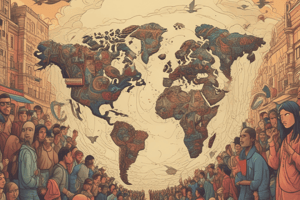Podcast
Questions and Answers
What is the impact of mental walls on physical walls?
What is the impact of mental walls on physical walls?
- They are not related.
- They have no impact on each other.
- They are somewhat related.
- They are closely interlinked. (correct)
What is the effect of gated communities on society?
What is the effect of gated communities on society?
- They promote integration.
- They create a sense of community.
- They separate cities. (correct)
- They protect citizens from outsiders.
What is the impact of separating children during their development?
What is the impact of separating children during their development?
- It makes integration impossible.
- It makes integration easier.
- It has no impact on integration.
- It makes integration difficult. (correct)
The construction of walls and fences has decreased since the attacks of 9/11.
The construction of walls and fences has decreased since the attacks of 9/11.
What is the purpose of the fence in the schoolyard?
What is the purpose of the fence in the schoolyard?
What did the author do to turn the fence into an interface and common ground?
What did the author do to turn the fence into an interface and common ground?
What did people write on the wooden boxes labeled 'What do you think?'
What did people write on the wooden boxes labeled 'What do you think?'
Flashcards are hidden until you start studying
Study Notes
The Impact of Walls and Mental Barriers on Society
- Since the attacks of 9/11, the construction of walls and fences has doubled, with about 30 new structures that were planned or built.
- Walls and fences provide a feeling of security, but they only separate and create an "us" and "them" mentality.
- Mental walls can grow so strong that they encourage us to build, keep, or strengthen physical walls.
- Physical and mental walls are closely interlinked, and one almost always comes with the other.
- When the Berlin Wall was built, people identified as one, but during the time of separation, both sides developed differently and formed individual identities.
- Even 15 years after the reunification, Germans still believed that cities on the other side of the former wall are further away than they really are, and political attitude affected estimation of distance.
- The mental wall keeps cities on the other side far away, and the higher and stronger this mental wall, the more difficult they seem to be reached.
- A study with a group of young Germans who grew up without the wall showed that this generation is just kind of bad at geography in general.
- Gated communities can be seen the same way as countries, just on the small scale, neighborhoods surrounded by walls and fences to protect citizens from other citizens.
- The physical and mental effects on the people living inside and the people kept outside are the same, separating cities, neighborhoods, and even playgrounds.
- Separating children during their development will make integration extremely difficult, if not impossible.
- School should be the place where children, all children, come together and learn -- learn from the teacher, but more importantly, learn from each other.
The Impact of Walls and Mental Barriers on Society
- Since the attacks of 9/11, the construction of walls and fences has doubled, with about 30 new structures that were planned or built.
- Walls and fences provide a feeling of security, but they only separate and create an "us" and "them" mentality.
- Mental walls can grow so strong that they encourage us to build, keep, or strengthen physical walls.
- Physical and mental walls are closely interlinked, and one almost always comes with the other.
- When the Berlin Wall was built, people identified as one, but during the time of separation, both sides developed differently and formed individual identities.
- Even 15 years after the reunification, Germans still believed that cities on the other side of the former wall are further away than they really are, and political attitude affected estimation of distance.
- The mental wall keeps cities on the other side far away, and the higher and stronger this mental wall, the more difficult they seem to be reached.
- A study with a group of young Germans who grew up without the wall showed that this generation is just kind of bad at geography in general.
- Gated communities can be seen the same way as countries, just on the small scale, neighborhoods surrounded by walls and fences to protect citizens from other citizens.
- The physical and mental effects on the people living inside and the people kept outside are the same, separating cities, neighborhoods, and even playgrounds.
- Separating children during their development will make integration extremely difficult, if not impossible.
- School should be the place where children, all children, come together and learn -- learn from the teacher, but more importantly, learn from each other.
Breaking Down Mental Walls: A Story of a Fence in Brussels
- A fence separates two schoolyards in Brussels, with children on both sides disliking each other and regularly arguing.
- The fence is seen as necessary to prevent chaos and protect children's toys.
- Children crawl under or climb over the fence to get their toys back.
- The author installs different games at the fence to turn it into an interface and common ground instead of a barrier.
- Children draw together, exchange pencils, and talk on the phone through the fence.
- The author designs a picture exhibition on the schoolyard showing children playing together through the fence.
- People write their thoughts, ideas, and wishes on wooden boxes labeled "What do you think?"
- Many people write "yes" on the boxes, indicating that the fence should go and they want to play with the other side.
- The exhibition shows the two sides their similarities and breaks down the mental wall between them.
- The author emphasizes that breaking a mental wall is a long journey and can be more difficult than tearing down a physical one.
- Walls do not solve problems, they only reduce symptoms, and often affect people who share culture and values despite geographic borders.
- The author urges readers to remember the impact of building walls and to challenge their own beliefs and opinions.
Studying That Suits You
Use AI to generate personalized quizzes and flashcards to suit your learning preferences.




